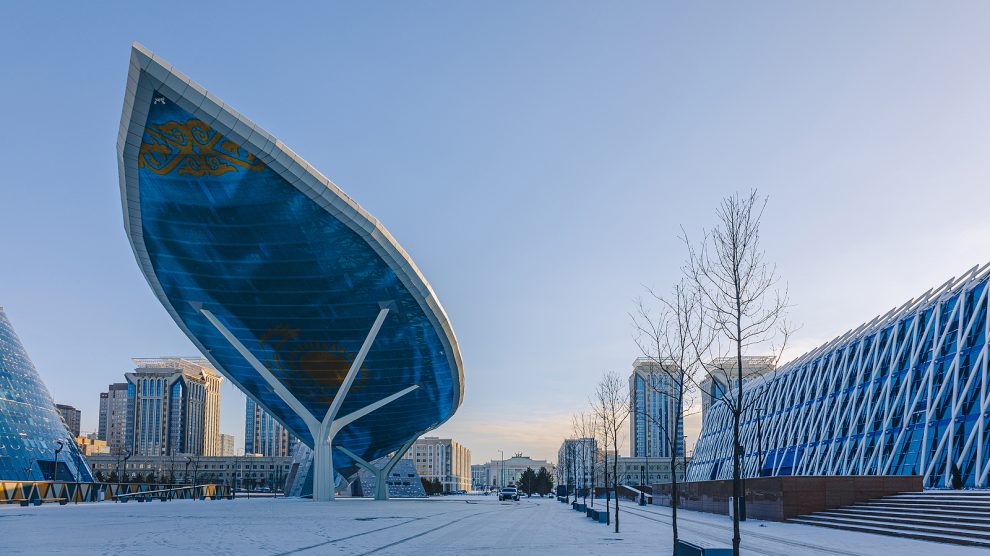As firms flee Russia for Kazakhstan and Middle Corridor trade increases, the country’s strategic location and commitment to global engagement will soon be highlighted at a major investment forum.
In the 30 years since its independence in 1991, Kazakhstan has leveraged its strategic location as a link between China, Russia, and Europe to become a regional hub for trade and commerce.
Multinational companies were eager to capitalise on its vast oil, gas, coal, and uranium reserves, and the country quickly established itself as a net energy exporter and the world’s largest producer of uranium ore.
- Foreign investors look set to back Kazakhstan’s economic reset
- Kazakhstan could be key to Europe’s energy transition
- Kazakhstan’s pivot towards the West is grabbing the attention of investors
Kazakhstan attracted over 320 billion US dollars of foreign direct investment (FDI) in its first three decades by prioritising the creation of favourable conditions for international companies. It is now home to 13 Special Economic Zones with tax incentives and “special legal regimes”. In 2018, the Astana International Financial Centre (AIFC) was launched and allows businesses to resolve civil and commercial disputes under a legal framework based on English common law.
Dr Kuat B. Akizhanov, an economics professor at KazGUU University in Astana, tells Emerging Europe, “The whole idea of creating the AIFC was to show how favourable Kazakhstan is for foreign investors. We’re talking about almost an offshore territory – even according to the Constitution, the AIFC is extraterritorial.”
“Trust is pretty strong between the government and the foreign investors,” he adds.
2022: A year of challenges and successes
The resilience of that trust is a testament to the stability maintained for investors in the face of unrest in January 2022 and the transition from long-time leader Nursultan Nazarbayev to current President Kassym-Jomart Tokayev. While President Tokayev initiated constitutional reforms to strengthen Kazakhstan’s parliament, limit presidential powers, and establish a Constitutional Court, he has continued to promote the AIFC and other incentives for FDI.
The gross inflow of FDI increased by 17.8 per cent and reached 22.1 billion US dollars in the first nine months of 2022.
Russia’s invasion of Ukraine and subsequent Western sanctions imposed on Moscow have prompted an exodus of companies from Russia. Over 50 multinationals have relocated from Russia to Kazakhstan and the number of Russian businesses in Kazakhstan increased by between 500 and 1,100 entities each month from the invasion through at least September 2022.
Kazakhstan is known for its energy production and mining, and these remain strong sectors. The government recently announced it was partnering with neighbouring Uzbekistan and Kyrgyzstan to build a large hydroelectric dam to expand green energy production and allow other water supplies to go towards irrigating the south of the country. Kazakhstan is also developing its critical mineral industry.
Diversification
However, diversifying the economy has been prioritised in recent years with focus on agriculture, tourism, financial technology, manufacturing, and pharmaceuticals.
Kazakhstan—along with Ukraine—was known as the “breadbasket of the Soviet Union”. It remains Central Asia’s largest grain producer and one of the world’s largest producers of wheat, but it is also working to process its grain in-house. Kazakhstan is also building on its history of pastoralism to modernise livestock breeding and expand production capacity of its poultry and shrimp farming.
After a slump in visitors from the pandemic, Kazakhstan is expanding its tourist infrastructure to make its natural beauty more accessible than ever. Resorts and recreational complexes are being developed in the Kaskasu gorge, the mountains of Esik, and the lakeshores of Bolshoye Chebache and Tekekol. A new ski resort is being built in Turgen.
The AIFC has become a “breeding ground” for successful fintech firms. Sunorak is making a jacket that can charge mobile phones with solar cells. Kaspi.kz provides banking services and saw its shares rise 26 per cent in October 2020 when it listed on the London Stock Exchange.
“The human capital is just incomparable to how it used to be 30 years ago. Nowadays, it’s usual for people to speak English,” Professor Akizhanov says.
2022 saw 36.9 per cent growth in investment in Kazakhstan’s manufacturing. There are new projects to increase the production of pharmaceuticals, syringes, medical gloves, dialysers, and other medical equipment.

The Astana International Forum
Since 2008, Kazakhstan’s capital has hosted policymakers, business leaders, academics, and representatives of international organisations from 74 countries at its Astana Economic Forum.
Now, the government of Kazakhstan is launching a new Astana International Forum. It will be held on the June 8 and 9 and focus on four key topics: foreign policy; security and sustainability; energy and climate; and economy and finance.
Speaking about the forum, President Tokayev said, “Kazakhstan has a long history of advancing constructive international relations, serving as a bridge between East and West – and while this policy has been firmly tested in 2022, it has proven resilient.
“We have shown the value of cooperation. Through the Astana International Forum, we hope to build new bridges and strengthen ties, as we come together to overcome the collective challenges we face, charting a new way forward – diplomatically, economically and politically.”
Unlike many news and information platforms, Emerging Europe is free to read, and always will be. There is no paywall here. We are independent, not affiliated with nor representing any political party or business organisation. We want the very best for emerging Europe, nothing more, nothing less. Your support will help us continue to spread the word about this amazing region.
You can contribute here. Thank you.







Add Comment